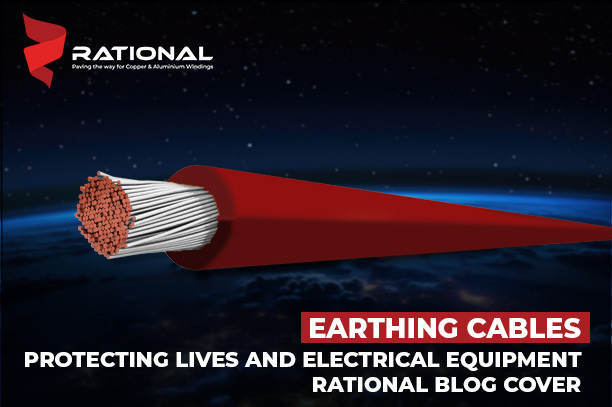Electricity powers every aspect of our lives. From homes to offices and industries, electricity plays an important role in keeping things running smoothly. However, there are chances of hazards if proper earthing cables are not used.
The essential component to ensure safety is earthing cables. Safety is paramount when it comes to laying the groundwork for establishing an electrical network. In this blog, we will explore the role of earthing cables, their significance in protecting lives and equipment, and how manufacturers like Rational Engineers contribute to this vital field.
What Are Earthing Cables?
Earthing cables are also known as grounding cables. These are conductive wires that connect electrical installations to the earth. This connection serves to protect both people and electrical equipment from electric shock and fault currents. By providing a direct path for fault current to flow into the ground, earthing cables help mitigate the risk of electrical fires and equipment damage.
The Importance of Earthing
- Safety First: The primary function of earthing cables is to ensure the safety of humans and equipment. In case of a fault, such as a short circuit, these direct the excess electrical current away from equipment and into the ground. This significantly reduces the risk of electric shock to individuals and minimises the risk of potential fire hazards.
- Equipment Protection: Electrical equipment is sensitive to fluctuations in current. Without proper earthing, surges in voltage can damage sensitive components, leading to costly repairs or replacements. Earthing cables help in maintaining a stable electrical environment, prolonging the life of your equipment.
- Regulatory Compliance: Various standards and regulations mandate the use of grounding cables in electrical installations. Compliance not only ensures safety but also protects businesses from legal liabilities and fines. Earthing cable manufacturers like Rational Engineers are well-versed in these regulations and can provide solutions that meet compliance standards.
Types of Earthing Cables
Earthing cables come in various types, designed to suit different applications. Some common types include:
- Copper: Copper is a popular choice for cables due to its excellent conductivity and durability. Copper cables can handle high currents and are resistant to corrosion.
- Aluminium: While less conductive than copper, aluminium is lighter and more cost-effective. Aluminium earthing cables are often used in larger installations where weight is a concern.
- Flexible: These cables are designed for applications that require movement or flexibility. They are often used in industrial settings where machinery may shift or vibrate.
- Flat: Used in specific installations, flat cables can provide a larger surface area for grounding, making them effective for certain applications.
Choosing The Right Earthing Cable
Selecting the appropriate earthing cable depends on various factors, including:
- Current Rating: The cable must be capable of handling the expected fault current. Consulting with manufacturers like Rational Engineers can provide insights into the correct specifications.
- Environmental Conditions: Consideration of the installation environment is crucial. Cables exposed to moisture, chemicals, or extreme temperatures require specific insulation and material properties.
- Installation Method: The method of installation—buried, surface-mounted, or integrated into equipment—can influence the type of earthing cable chosen.
Best Practices For Earthing Cable Installation
To maximise the effectiveness of earthing cables, these best practices leading manufacturers like Rational Engineers follow:
- Proper Sizing: Ensure that the earthing cable is appropriately sized for the application. This involves calculating potential fault currents and selecting a cable that can handle those loads.
- Quality Connections: Ensure that all connections are tight and secure. Poor connections can lead to increased resistance and reduce the effectiveness of the earthing system.
- Regular Testing: Periodically test the earthing system to ensure its integrity. This includes checking resistance levels and inspecting physical conditions.
- Compliance with Standards: Always adhere to local and national electrical codes when installing grounding cables. This ensures safety and reduces liability.
- Documentation: Keep detailed records of the installation, including specifications, testing results, and maintenance activities. This documentation is vital for future reference and compliance audits.
Conclusion
Earthing cables are a fundamental component of electrical safety, protecting lives and equipment from potential hazards. By providing a reliable path for fault currents, they play a crucial role in maintaining the integrity of electrical systems. Manufacturers like Rational Engineers are pivotal in this field, offering high-quality, and customised solutions that meet industry standards.
In a world increasingly dependent on electricity, the importance of grounding cables cannot be overstated. Investing in the right earthing solutions not only enhances safety but also contributes to the longevity and efficiency of electrical equipment. Whether you’re a contractor, engineer, or facility manager, understanding the significance of grounding cables and working with reputable manufacturers will help ensure a safer electrical environment for all.

